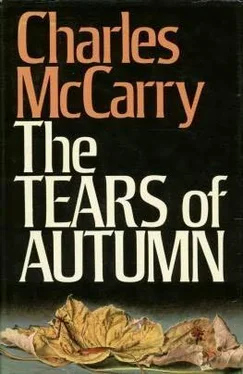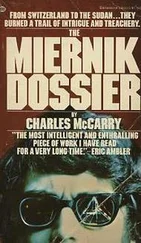“Could you tell what sort of an accent he had?”
“Not really. A lot of tongue and lips in it.”
Christopher looked at his watch. “It’s three-thirty,” he said. “I ought to be back in less than two hours.”
Molly gave him a long look and then laughed. “Ah,” she said, “the joys of love.”
“Molly, you have to understand. This may be nothing-I may not even make the contact when I see who it is. But I have to know. It could be important.”
“It could be a killer.”
“In Saint Peter’s? Shooting a man in front of the Pietà is the sort of thing a lover or a lunatic would do-not a professional.”
“Kennedy was shot in Dallas, in the middle of a crowd of people with cameras.”
“Yes,” Christopher said, “but there’s no way to kill the President of the United States discreetly.”
“What you’re saying is that if they kill you-or me, I suppose-they’ll not simply kill us but destroy all trace of us. Isn’t that it?”
“That’s the idea, Molly.”
They sat on opposite sides of a narrow table, and Christopher could see every detail of Molly’s face. Her eyes were closed and she pressed her lips together, so that a web of lines appeared for an instant on her smooth skin. Tears ran through her lashes.
“My God, how cruel,” she whispered. “They leave a person no meaning at all.”
Christopher turned up the volume on the phonograph and told Molly what to do while he was gone. On his way out of the building, he used the stairs again, searching the hallways on each floor as he descended.
The day was as gray as slate. There was no one in the street except a shepherd, down from the Abruzzi for the Christmas season, who stood on the low wall above the river playing bagpipes. The shepherd’s wild music followed Christopher across the Ponte Sant’Angelo, but no one was behind him, and he was still alone when he reached Saint Peter’s Square. He walked through one of the colonnades of Saint Peter’s, loitering among the pillars, but still saw no one following.
Inside the basilica, he walked along the left wall, pausing to look at paintings. In an alcove near the great altar he saw the original of Luong’s picture of Christ: its meaning was being explained in German by a guide to a group of tourists. Christopher walked on, behind the main altar. Foreign priests were celebrating mass in the chapels along the sides of the basilica.
Gherman Klimenko, standing before the Pietà with a guidebook in his hand, saw Christopher coming. He leaned on the chapel rail, as if to read Michelangelo’s signature on the girdle of the Madonna, then snapped the guidebook shut and walked leisurely to the other side of the church. Christopher paused for a moment at the sculpture and watched Klimenko’s gray-tweed overcoat disappear into the group of German tourists.
He followed Klimenko past Luong’s Christ and saw the Russian get into the elevator that led to the roof of Saint Peter’s. Christopher took the stairway, and Klimenko was already on the gallery, gazing down into the Vatican gardens, when Christopher got there. He went to the opposite side of the terrace and waited until a young couple finished taking photographs and descended the stairs. Klimenko turned and looked at him, and Christopher walked across the flagstones toward him.
“This has been very dangerous for me, coming to the same place at the same hours for three days,” Klimenko said.
“I’ve been away. I only got your message today.”
Klimenko had no hair and he was always cold. Even in Africa he wore a buttoned suit. He stared morosely at Christopher and pulled his fur hat tighter on his bald head; a sharp wind filled with rain blew the skirt of his coat and he leaned over and tucked it between his knees.
“I think you know what I want,” Klimenko said.
Christopher remained silent. The great building and the trees in its courtyards absorbed the detonation of the Roman traffic, so that he and Klimenko stood in a pool of silence at the back of the roof.
“You won’t answer me,” Klimenko said.
“You haven’t asked me a question, Gherman.”
Klimenko turned his back to Christopher and rocked up and down on his toes.
“I’m worn out,” he said, as if speaking to one of the Swiss guards pacing below them in the garden. He turned around again. “I want to make a contact,” he said.
The wind nearly took Klimenko’s hat and they both reached for it; Christopher caught it and Klimenko screwed it down again on his forehead.
“Paul,” he said. “We can only talk for ten minutes. Don’t waste the time. You know what I want.”
“I think so. But I can’t help you, Gherman. Walk into the American embassy. You can be there in ten minutes in a taxi.”
“Christopher-don’t do this. They know. I’ve been running for a week. Where do you think they expect me to go? They’re waiting outside the embassy in the Via Veneto. You know the system-a car is waiting around the corner. They’d have me before I could walk across the sidewalk.”
Christopher shrugged. “Then go to Paris or Bern.”
“You’re my only hope. I’ve been waiting for three days. You don’t know what it’s like.”
“No, I don’t.”
“Look,” Klimenko said. “I have no more energy for charades.” He seized Christopher’s arm. “I told you, I’m worn out.”
Klimenko’s teeth chattered. He walked back and forth rapidly on the roof, swinging his arms around his body to warm it. He came back, close to Christopher, and spoke in a hoarse whisper.
“Paul-have I ever given a hint that I knew about you in all the years? Ever? How many times have I seen you, in how many places? We drank whiskey together in the bar of the New Stanley Hotel in Nairobi. We had lunch in the Fin Bee in Geneva, as if we were friends. We talked about opera, the ballet, the way BOAC is always late.”
“I’m glad you have such tender memories,” Christopher said, “but if you think you know anything about me, you’re wrong.”
Klimenko stood up to his full height. He was still a foot shorter than Christopher. Holding his clenched fists at his sides, he said, “All right. In 1959 you were in the Sudan; a Pole named Miernik was killed by the natives in the desert and you brought his body out. In 1960 you were meeting an agent named Horst Bülow in front of the S-bahn station at the zoo in Berlin; he was run down by a black Opel and killed before your eyes. In 1962 you penetrated the Chinese operation in Katanga with Alphonse Nsango and gave him gold to pay for the juju that broke one of their insurgent groups. In 1961 you were in Laos talking to a certain Hmong who is now a general. Your case officer is Thomas R. Webster, who lives at 23-bis, avenue Hoche, Paris. The chief of clandestine operations in Washington is David Patchen, and in practice you are answerable only to him. I can go on.”
Christopher said, “If all that is true, why do you think I won’t shoot you right now?”
Klimenko opened his eyes. “You people don’t kill. We know that, too.”
Christopher was not surprised at the quality of Klimenko’s information, and he knew that Klimenko did not expect him to be startled.
Klimenko took Christopher’s arm and walked him around the gallery. The mossy slope of Michelangelo’s dome rose behind them. Christopher heard the wail of pipes, and saw a shepherd walking across the piazza below; the man wore a sheepskin tied around his waist with a rope and a red cap like the bagpiper he’d seen by the Tiber. Straining his eyes, Christopher saw that this man had a different face.
“They close this gallery at four-thirty,” Christopher said. “We’d better go down.”
“I didn’t come out empty-handed, Paul. I can show you samples.”
Читать дальше












